- Home
- Martin Cruz Smith
Red Square Page 2
Red Square Read online
Page 2
Some men staggered back with sleeves on fire and, as the crowd spread and Arkady pushed through, he saw Rudy Rosen riding a blazing phaeton, upright, face black, hair aflame, hands clasped to the wheel, brilliant in his own glow but motionless within the thick, noxious storm clouds that whipped from the interior and out of the gutted windows of his car. Arkady got near enough to look through the windscreen at Rudy's eyes sinking into
the smoke. He was dead. There was that silence, that gutted gaze in the middle of the flames.
Around the burning car other cars were moving. Spilling rugs, gold coins, VCRs, a mass evacuation flowed to the gate. The ambulance lumbered off, ploughing over a figure in its headlights, followed by a Chechen motorcade. Motorbikes split into several streams, searching for gaps in the site fence.
Yet some men stayed and, as the stars drifted overhead, fought to catch them. Arkady himself leaped and plucked from the air a burning Deutschmark, then a dollar, then a franc, all lined with worms of burning gold.
Chapter Two
* * *
Although the ground was still in shadow, Arkady could see that the site was a layout of four twenty-storey towers around a central square – three of the towers were faced in pre-cast concrete while the last was still in a skeletal girders-and-crane phase that in the hopeful light of dawn appeared both gargantuan and frail. On the ground floors he supposed there would be restaurants, cabarets, perhaps a cinema, and in the middle of the square, when the earthmovers and cement mixers were gone, a view of coaches and taxis. Now, however, there were a forensic van, the Zhiguli and the black shell of Rudy Rosen's Audi sitting on a black carpet of singed glass. The Audi's windows were hollow and the heat of the fire had exploded and then burned the tyres, so at least it was the stench of burnt rubber that was strongest. As if listening, Rudy Rosen sat stiffly upright.
'Glass seems to be evenly distributed,' Arkady said. Polina followed with her pre-war Leica and took a picture every other step. 'Glass is melted closer to the car, which is a four-door Audi 1200. Left doors shut. Bonnet shut, headlights burned out. Right doors shut. Boot shut, rear lights burned out.' There was nothing to do but get on his hands and knees. 'Fuel tank is blown. Silencer separated from exhaust pipe.' He got up. 'Numberplate black now but a Moscow number is legible and identified as property of Rudik Rosen. By the wide spread of glass, origin of fire seems to have been inside the passenger compartment, not out.'
'Pending expert reports, of course,' Polina said to maintain her reputation for disrespect. Young and tiny, the pathologist wore one coat and one smirk summer and winter, her hair piled high and stabbed ferociously with pins. 'You should get the thing up on a lift.'
Arkady's comments were written down by Minin, a detective with the deep-set eyes of a maniac. Behind Minin a cordon of militia marched across the site. Arson dogs dragged their handlers around the towers, racing from pillar to post, raising their legs.
'Exterior paint is peeled,' Arkady went on. 'Chrome on the door handle is peeled.' There go prints, he thought; nevertheless, he wrapped a handkerchief around his hand to open the front passenger door.
'Thank you,' Polina said.
At Arkady's touch the door swung open, spilling ash on his shoes.
'Interior of the car is gutted,' he continued. 'Seats are burned down to frames and springs. Steering wheel seems to have melted and disappeared.'
'Flesh is tougher than plastic,' Polina said.
'Rear rubber floor mats melted around what appears to be puddled glass. Rear seat burned to springs. Charred computer battery and residue of non-ferrous metal. Flecks of gold probably from conductors.' Which was all that was left of the computer Rudy was so proud of. 'Metal shuttles from computer disks.' The megabytes of information. 'Covered with ash.' The file boxes.
Reluctantly, Arkady moved to the front. 'Flash signs by the clutch. Fragments of charred leather. Plastic residue, batteries in dash compartment.'
'Naturally. The heat was intense.' Polina leaned in to snap a shoe with her Leica. Two thousand degrees, at least.'
'On the front seat,' Arkady said, 'a cashbox. The tray is empty and charred. Under the tray are small metal contacts, four batteries, perhaps the remains of a transmitter and tape recorder. So much for surveillance. Also on the seat is a metal rectangle, perhaps the back of a calculator. Key in the ignition is turned to 'Off'. Two other keys on the ring.'
Which brought him to the driver. This was not where Arkady excelled. In fact, this was where he could have used a long walk and a cigarette.
'With the burned ones you have to open the camera aperture all the way just to get any detail,' Polina said.
Detail? 'The body is shrunken,' Arkady said, 'too badly charred to be immediately identifiable as male or female, child or adult. Head is resting on the left shoulder. Clothes and hair are burned off; some skull shows through. Teeth do not appear salvageable for moulds. No visible shoes or socks.'
Which didn't really describe the new, smaller, blacker Rudy Rosen riding on the airy springs of his chariot. It didn't capture his full transformation into tar and bone, the particular nakedness of a belt buckle hanging in the pelvic cavity, the wondering sockets of the eyes and the molten gold of his fillings, the trousers stripped for speed, the way his right hand gripped the steering wheel as if he were cruising through hell, and the fact that the pearlized wheel had melted like pink toffee on his fingers. It didn't convey the mysterious way bottles of Starka and Kuban vodka had liquefied and pooled, how hard currency and cigarettes had vanished in a puff. 'Everybody needs me.' Not any more.
Arkady turned away and saw that as black as Rudy Rosen was, Minin's face registered nothing but satisfaction, as if this sinner had suffered barely enough. Arkady took him aside and aimed him at some of the searchers among the militia who were stuffing their pockets. The ground was strewn with goods abandoned in the panic of the evacuation. 'I told them to identify and chart what they found.'
'You didn't mean for them to keep it.'
Arkady took a deep breath. 'Right.'
'Look at this.' Polina probed a corner of the back seat with her hairpin. 'Dried blood.'
Arkady went over to the Zhiguli. Jaak was in the back seat, questioning their only witness, the same unlucky man Arkady had met when he was waiting to talk to Rudy. The mugger with too many zlotys. Jaak had tackled him just inside the fence.
According to his ID and work papers, Gary Oberlyan was a Moscow resident and hospital orderly, and, by the looks of his coupons, due for a new pair of shoes.
'You want to see his ID?' Jaak said. He pulled back Gary's sleeves. On the inside of the left forearm was the picture of a nude sitting in a wine glass and holding the ace of hearts. 'He likes wine, women and cards,' Jaak said. On the right forearm was a bracelet of spades, hearts, diamonds and clubs. 'He loves cards.' On the left little finger, a ring of upside-down spades. 'This means conviction for hooliganism.' On the right ring finger, a knife through a heart. 'This means he's ready to kill. So let's say Gary did not wash up in a basket of reeds. Let's say Gary is a multiple offender who was apprehended at a gathering of speculators and who should cooperate.'
'Fuck you,' Gary said. In the daylight his broken nose looked welded on.
'Still have your forints and zlotys?' Arkady asked.
'Fuck you.'
Jaak read from his notes. 'The witness states that he spoke to the fucking deceased because he thought the deceased was someone who owed him money. He then left the fucking deceased's car and was standing at a distance of approximately ten metres about five minutes later when the fucking car exploded. A man the witness knows as Kim threw a second fucking bomb into the car and then ran.'
'Kim?' Arkady asked.
'That's what he says. He also says he burned his fucking hands trying to save the deceased.' Jaak reached into Gary's pockets to pull out handfuls of half-burned Deutschmarks and dollars.
It was going to be a warm day. Already the dewiness of dawn was turning to beads of sweat. Arkady s
quinted at a sunlit banner that hung limply across the top of the western tower. 'NEW WORLD HOTEL!' He imagined the banner filling with a breeze and the tower sailing away like a brigantine. He needed sleep. He needed Kim.
Polina knelt on the ground on the passenger side of the Audi.
'More blood,' she called.
• • •
As Arkady unlocked the door to Rudy Rosen's flat, Minin pressed forward with a huge Stechkin machine pistol. Definitely not standard issue.
Arkady admired the weapon but he worried about Minin. 'You could saw a room in half with that thing,' he told him. 'But if someone's here, they would have opened the door or blown it off with a shotgun. A pistol won't help now. It just scares the ladies.' He dispensed a reassuring nod to the two street sweepers he'd gathered as legal witnesses to the search. They answered with shy glimpses of steel teeth. Behind them, a pair of forensic technicians pulled on rubber gloves.
Search the home of someone you don't know and you're an investigator, Arkady thought. Search the home of someone you do know and you're a voyeur. Odd. He'd watched Rudy Rosen for a month but never been inside before.
Upholstered front door with peephole. Living/dining room, kitchen, bedroom with TV and VCR, another bedroom turned into an office, bathroom with whirlpool. Bookcases with hardback collections of culture (Gogol, Dostoyevsky), biographies of Brezhnev and Moshe Dayan, stamp albums and back issues of Israel Trade, Soviet Trade, Business Week and Playboy. At once, the forensic technicians began a survey, Minin one step behind them to make sure nothing disappeared.
'Don't touch a thing, please,' Arkady told the street sweepers, who stood reverentially in the middle of the room as if they had stepped into the WinterPalace.
A kitchen cabinet held American scotch and Japanese brandy, Danish coffee in aluminum-foil bags; no vodka. In the refrigerator, smoked fish, ham, pâté and butter with a Finnish label, a cool jar of sour cream and, in the freezer, a chocolate bar and an ice-cream cake with pink and green frosting in the shape of flowers and leaves. It was the sort of cake that used to be sold in common milk shops, and was now a fantasy found only in the most special buffets – a little less rare, say, than a Fabergé egg.
Kilims on the living-room floor. On the wall, matched portrait photographs of a violinist in formal clothes and his wife at a piano. Their faces had the same roundness and seriousness as Rudy's. The front window looked down on Donskaya Street and, over rooftops, north towards the giant Ferris wheel slowly rolling nowhere in Gorky Park.
Arkady moved on to an office with a Finnish maple desk, Stairmaster, telephone and fax. A power-surge protector at the outlet, so Rudy had used his laptop computer in the flat. The drawers held paper-clips, pencils, stationery from Rudy's hotel shop, savings book and receipts.
Minin opened a closet and slapped aside American tracksuits and Italian suits. 'Check the pockets,' Arkady said. 'Check the shoes.'
In the chest of drawers in the bedroom even the underwear had foreign labels. Bristle brush on the television set. On the night table, travelogue videotapes, satin sleep mask and alarm clock. A sleep mask was what Rudy needed now, Arkady thought. Safe but not foolproof, was that what he had told Rudy? Why did anyone ever believe him?
One of the street sweepers had followed him as silently as if she moved in felt slippers. She said, 'Olga Semyonovna and I share a flat. We have Armenians and Turkmen in the other rooms. They don't speak to each other.'
'Armenians and Turks? You're lucky they don't kill each other,' Arkady said. He unlocked the bedroom window for a view of a courtyard garage. Nothing hanging outside the sill. 'The communal apartment is death to democracy.' He thought about it. 'Of course democracy is death to the communal apartment.'
Minin entered. 'I agree with the chief investigator. What we need is a firm hand.'
The sweeper said, 'Say what you want, in the old days there was order.'
'It was rough order but it was effective,' Minin said and they both turned to Arkady with such expectation that he felt like a mad dog on a pedestal.
'Agreed, there was no shortage of order,' he said.
At the desk, Arkady filled in the Protocol of Search: date, his name, in the presence of – here he entered the names and addresses of the two women – according to search warrant number, entered Citizen Rudik Abramovich Rosen's residence, apartment 4A at 25 Donskaya Street.
Arkady's eye was caught by the fax again. The machine had buttons in English – for example, 'Redial'. Gingerly he lifted the phone and pushed the button. The receiver produced tones, a ring, a voice.
'Feldman.'
'I'm calling for Rudy Rosen,' Arkady said.
'Why can't he call himself?'
'I'll explain when we talk.'
'You didn't call to talk?'
'We should meet.'
'I don't have time.'
'It's important.'
'I'll tell you what's important. They're going to shut the Lenin Library. It's collapsing. They're turning off the lights, locking the rooms. It's going to be a tomb like the pyramids at Giza.'
Arkady was surprised that anyone associated with Rudy cared about the state of the Lenin Library. 'We still have to talk.'
'I work late.'
'Anytime.'
'Outside the library, tomorrow at midnight.'
'Midnight?'
'Unless the library comes down on top of me.'
'Let me just check the phone number.'
'Feldman. F-e-l-d-m-a-n. Professor Feldman.' He recited the number and hung up.
Arkady set the receiver down. 'Terrific machine.'
Minin had a bitter laugh for one so young. 'The forensic bastards will strip this place and we could use a fax.'
'No, we leave everything, especially the fax.'
'Food and alcohol, too?'
'Everything.'
The second sweeper's eyes grew larger. The magnetic force of guilt made her stare at pearls of vanilla ice cream that traced a trail in the oriental carpet to the refrigerator and back.
Minin whipped open the freezer door. 'She ate the ice cream while our backs were turned. And the chocolate's gone.'
'Olga Semyonovna!' The first sweeper was also shocked.
The accused lifted her hand from a pocket and seemed to sink at the knees as if the weight of the incriminating chocolate bar were too much. Tears coursed down the folds of her cheeks and dropped from her trembling chin as if she had stolen a silver cup off an altar. Terrific, Arkady thought, we've made an old woman cry over chocolate. How could she not succumb? Chocolate was an exotic myth, a whiff of history, like the Aztecs.
'Well, what do you think?' Arkady asked Minin. 'Should we arrest her, not arrest her but beat her, or just let her go? It would be more serious if she had taken the sour cream, too. But I want to know your opinion.' Arkady really was curious to learn how zealous his assistant was.
'I suppose,' Minin said finally, 'we can let her go this time.'
'If you think so.' Arkady turned to the women and said, 'Citizens, that means you both will have to help the organs of the law a little more.'
Soviet garages were mysteries because steel siding was not legally for sale to private citizens, yet garages constructed of such siding continued to appear magically in courtyards and multiply in rows down backstreets. Rudy Rosen's second key opened the mystery in the courtyard. The hanging bulb Arkady left untouched. In the sunlight he could see a tool kit, cases of motor oil, windscreen wipers, rearview mirrors and blankets kept to cover the car in winter. Under the blankets there was nothing more unusual than tyres. Later Minin and the technicians could dust the bulb and tap the floor. The sweepers had stood timidly in the open door the entire time; the old dears hadn't tried to make off with even a lug wrench.
Why wasn't he tired or hungry? He was like a man with a fever but no diagnosed disease. When he caught up with Jaak at the Intourist Hotel lobby, the detective was swallowing caffeine tablets to stay awake.
'Gary's full of shit,' Jaak said. 'I
don't see Kim killing Rudy. He was his bodyguard. You know, I'm so sleepy that if I find Kim, he's going to shoot me and I won't even notice. He's not here.'
Arkady looked around the lobby. To the far left was a revolving door to the street and the outdoor Pepsi stand that had become a landmark for Moscow prostitutes. Inside stood a line of security men who scrupulously let in only prostitutes who paid. Camped within the grotto darkness of the lobby, tourists waited for a bus; they had been waiting for some time and had the stillness of abandoned luggage. The information stands were not only empty but seemed to express the eternal mystery of Stonehenge: why were they built? The only action was to the right, where a semi-Spanish courtyard under a skylight invited attention to the tables of a bar and the stainless-steel glitter of slot machines.
Rudy's lobby shop was the size of a large armoire. A case displayed postcards with views of Moscow, monasteries, the fur-trimmed crowns of dead princes. On the back wall hung ropes of amber nuggets and the bunting of peasant shawls. On the side shelves, wooden, hand-painted dolls of ascending sizes crowded around plaques for Visa, MasterCard, American Express.
Jaak unlocked and opened the glass door. 'One price for credit cards,' he said, 'half price for hard currency, which, when you consider that Rudy bought the dolls from idiots for rubles, still gave him a profit of a thousand per cent.'
'Nobody killed Rudy over dolls,' Arkady said. Handkerchief on his hand, he opened the counter drawer and flipped through a ledger. All figures, no notes. Minin and forensics would have to come here, too.
Jaak cleared his throat and said, 'I have a date. See you in the bar.'
Arkady locked the shop and wandered across the courtyard to the slot machines. They displayed draw poker or revealed plums, bells and lemons on wheels of chance under instructions in English, Spanish, German, Russian and Finnish. All the players were Arabs who circulated joylessly, setting down cans of orange 'Si Si' soda to stack tokens. In the middle of the machines an attendant poured a silvery stream of tokens into a mechanical counter, a metal box with a crank that he kept in furious motion. He jumped when Arkady asked him for a light. Arkady caught his own reflection on the side of a machine: a pale man with lank, dark hair in desperate need of sunshine and a shave, but not frightening enough to account for the way the attendant wrestled with his lighter.

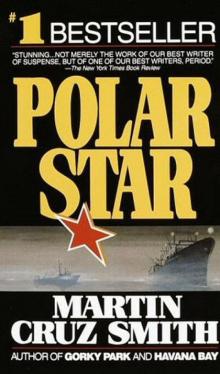 Polar Star
Polar Star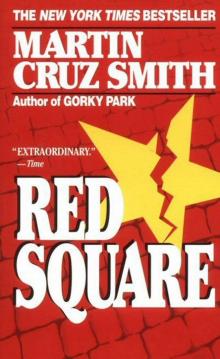 Red Square
Red Square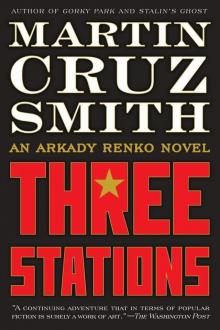 Three Stations
Three Stations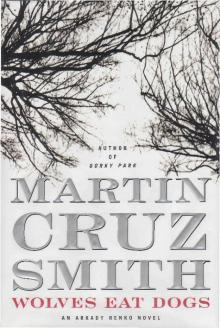 Wolves Eat Dogs
Wolves Eat Dogs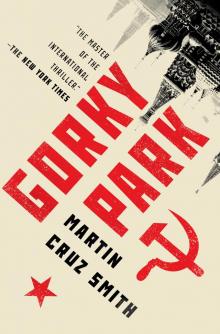 Gorky Park
Gorky Park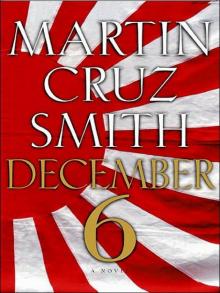 December 6
December 6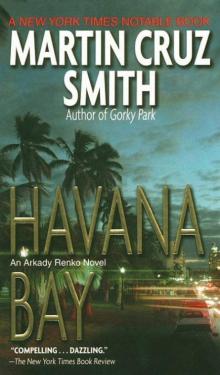 Havana Bay
Havana Bay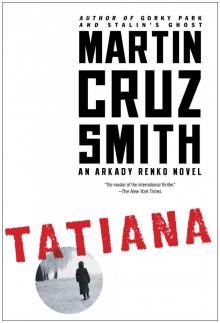 Tatiana
Tatiana The Girl From Venice
The Girl From Venice Stalin's Ghost
Stalin's Ghost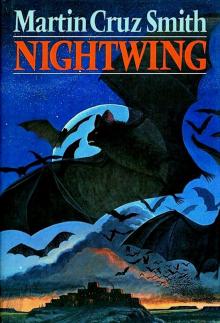 Nightwing
Nightwing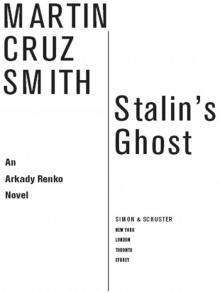 Stalin s Ghost
Stalin s Ghost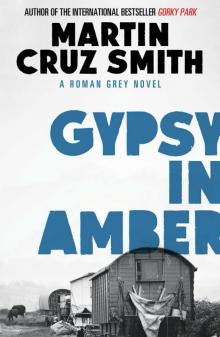 Gypsy in Amber
Gypsy in Amber Rose
Rose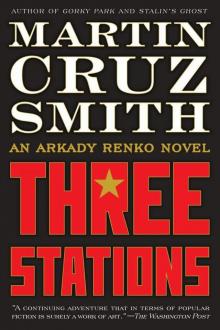 Three Stations: An Arkady Renko Novel
Three Stations: An Arkady Renko Novel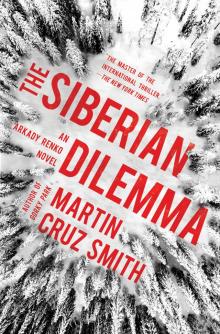 The Siberian Dilemma
The Siberian Dilemma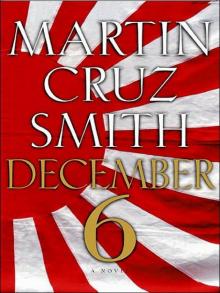 December 6 (V5.0)
December 6 (V5.0)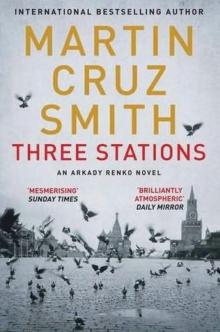 Three Stations ar-7
Three Stations ar-7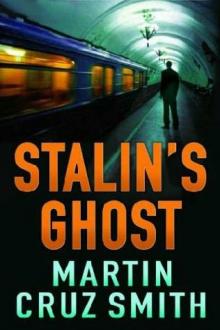 Stalin’s Ghost ar-6
Stalin’s Ghost ar-6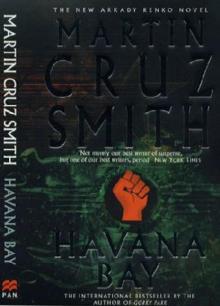 Havana Bay ar-4
Havana Bay ar-4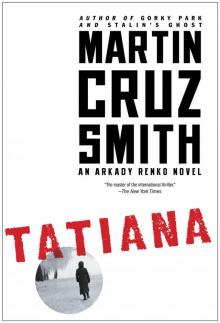 Tatiana ar-8
Tatiana ar-8